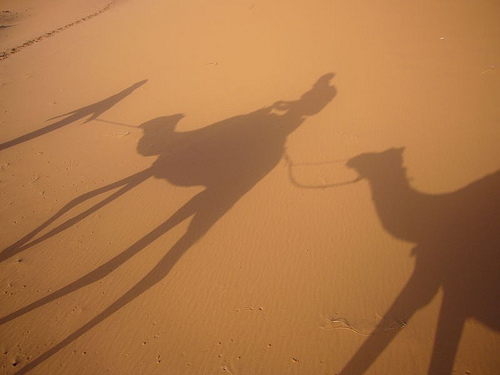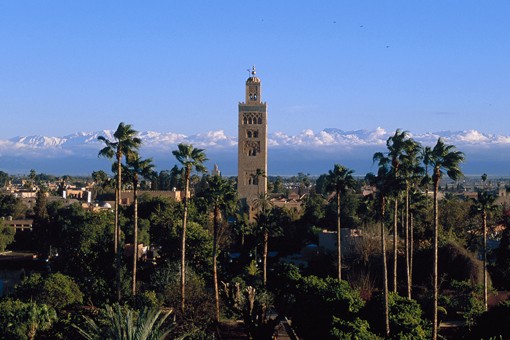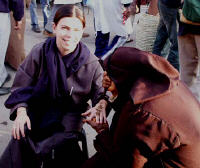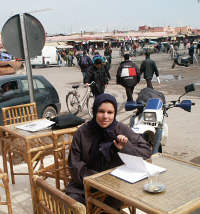Three Meters of Snow
Morocco
“Morocco’s great, just accept that you will be hustled, so it won’t come as a surprise when it happens,” warned the 65-year-old grandmother.
This was the last bit of advice I received from a traveler who was recalling her experiences in Africa. I never planned to travel in that region because of the negative news coverage in the States. However, word of mouth and cheaper prices seemed more credible reasons than political hype. Plus, being humbled by the accomplishments of a lone grandmother wandering around Morocco didn’t help my ego. It’d be hard to say I wasn’t shamed into going.
I met two backpackers at a hostel in Algeciras, Spain who were taking the ferry to Tangier, Morocco. Kohei was a Japanese street performer who played his guitar and learned Flamenco while in Spain. He was the only one who had been to Africa. Till was a German student on his wanderjahr who wanted to retrace the trek his father had taken many years ago in the High Atlas. I had similar interests in trekking and we quickly devised a plan to hike together. Unfortunately, after all our planning, Till realized that his passport was still at home. Being an EU member means that a passport has lesser value than most other travelers attribute to it. He was left standing at the dock wishing Kohei and I good luck while he tried to figure out how to get into Morocco without a passport.
Tangier is the closest city to draw in European vacationers and where the best hustlers make their keep. Unless you can quickly navigate yourself from the port to the bus or train station, you are a prime target as a first-time clueless tourist. Kohei wanted to get to work and I wanted to get to the mountains, so we ran the gauntlet past the taxi guys and made it to the bus depot and onto Marrakech.
Most of the action in the city gravitates around the Djemaa el-Fna, the main market square. Kohei had played here in the low season and had no problem staking out a spot. It was May and the traditional performers had reclaimed their areas. A permit was now needed to perform in the square. Kohei was sent in bureaucratic circles trying to get permission to play in the square. Meanwhile, since Till had been my only source of information for the trek, I thought it wise to get some second opinions. Most of the conversations followed this line.
“How is the trekking in the Atlas?” I asked, trying to look confident.
“Oh, my friend, there are three meters of snow at the top, you will need a guide and donkey,” said the faux guide. “My family lives there, many years as guide, give you good price, my friend.”
“Impossible to reach the top with those shoes, my friend,” said the shoe vendor, pointing at my sneakers. “These are the best shoes! One hundred fifty dirham for you, my friend.”
“It’s May, is there really snow still on the mountains?” I asked the receptionist at the Hotel Ali, the tourist center. “Yes, very difficult, I can show you where to get a tour for only 900 dirham, my friend.”
Sitting at one of the food booths in the square, I found a traveler who had just come back from hiking. He said that an ice axe served him well, but a hiking stick would have worked just as well. Nothing else was needed. He did warn me about altitude sickness as he had tried to ascend too quickly and got sick. I finally had a conversation where money was not a required topic. So, feeling confident about the trip, I set off to get out of the city.
“How do I get to the mountains?” I asked the hotel manager.
“There is too much snow at the top, my friend,” he warned.
“I know. How do I get to the mountains?” I asked the hotel manager again.
“Take the taxi, my friend. It’s quicker,” he said.
“Just pick one up anywhere, huh?” I asked, already assuming the answer would be yes.
“No, my friend, here,” he said pointing to a small intersection outside the city center.
“How much, in U.S. dollars?” I asked, seeing that it was at least 40 kilometers away.
“One or two dollars, my friend,” he said, happy to see the shock on my face.
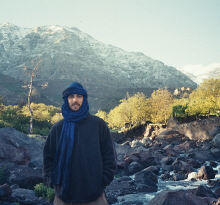

Imlil, the start of my trek
![]()
![]()
The catch is that you have to wait until six people can cram into the taxi. Once halfway up the mountain, I had to take a delivery truck the rest of the way, this time 25 people crammed together. We only had to stop once for a bulldozer to fix the road after a rockslide. I got into Imlil which is at an altitude of 1,740 meters. It had rained the whole way up, so I could not get a scale of the mountains around me. The gîte (a building with thin mattresses on the floor, pretty basic) was empty and the owner nowhere to be found. I arranged to pitch a tent on the roof of a hotel next door and took it easy for the night.
What a view when I woke up – the sky was clear and there were towering snowcapped mountains in the background. Kundun was filmed here, if you need a visual. I planned to climb Jbel Toubkal, the highest mountain in North Africa. At 4,167 meters, just less than half of Mt. Everest, it’s higher than any of the Appalachian mountains I was used to seeing.
I got much the same pitch from the locals as I did from the people of Marrakech. My financial moment of weakness overcame me and I rented an ice axe, since there were no trees to make a hiking stick. From Imlil to a refuge 1,000 meters below, the summit was supposed to be a five-hour climb. The reason there are so many Berbers offering to be guides is that there are no trail signs. I just dead reckoned with my compass and took any mule path that looked big enough. Let’s just say it took over seven hours to get to the top. Once there, there were plenty of people at the refuge, and I met the owner who hadn’t seen an American in a while.
“I love Americans,” boasted the manager.
I’m sure he was genuine in his statement. What he neglected to clarify was that he loved Americans who paid him money. When I informed him that I would be pitching my tent for free a little down the mountain, he suddenly changed his demeanor.
“You cannot use the kitchen or any facilities,” ordered the manager. “You have no crampons, no guide! It is not safe for you to climb, my friend,” he said, suddenly showing concern.
I said I’d rest on it and let him know if I needed to rent equipment and a guide in the morning. The sky was crystal clear and shooting stars were frequent.
I woke at six a.m. when the sun came up and understood the sales pitch I’d been getting all week. The only justification for guides selling you climbing equipment is if you climb early in the morning when the snow is hard and icy. If you wait until eight or nine, the snow softens with the sun – no problem. I’m sure the conditions are much different in winter and would rightly justify using crampons. I set out at nine thirty and didn’t reach the top until one thirty. The oxygen deprivation made this the hardest climb I’d ever done. At first I would stop every hundred meters, then fifty meters, and by the top, every ten meters. I was the last one up except for a French couple. They were professional guides and also without major gear.
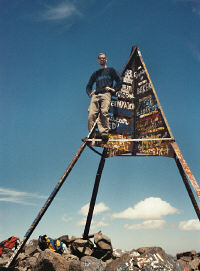

Summit marker for Jbel Toubkal, elev. 4,165 m
![]()
![]()
It was beautiful at the top and there was not an inch of snow near the summit. I was above the clouds and it was warm enough for shorts and a T-shirt. I only had to walk in snow a few places in the valley coming up. The rest was scree and boulders.
The descent was much more fun. I made it down in about an hour. How? Sliding on my butt! I had a plastic bag for my clothes and it worked as a makeshift sled. I was soaked when I got back to the refuge. The friendly owner was there to greet me and he refused use of any room to change. So, I changed behind the building and walked around in my underwear until my pants dried. While I was waiting around, trying to convince the next set of climbers they didn’t need crampons, who do I see? Till! Nothing like an unexpected meeting in the mountains while half naked.
Till had gotten his passport mailed to him and we missed meeting each other in Marrakech by an hour. After the shock of seeing someone I never expected to see again wore off, I turned down the offer to ascend the mountain again with Till. Instead, the previous itinerary we had worked out would still fit our schedules. We decided to go on a three-day trek through the Atlas. I would go down and wait for him to ascend Toubkal and the next day we would start. The descent was much easier now that I knew the way. I found a gîte owner with a much cheaper room and gave the tent a rest.
I spent the rest of the day talking to climbers making their way up the mountain. I must have sounded like a grizzled old man who claimed everything was tougher in his day. Walked 20 miles to school, in the snow, uphill both ways! No one seemed to believe that I made it up the mountain without any gear, sans hiking boots as well. Either way, Till got down the mountain around seven in the evening. He had a little more trouble with the altitude sickness, but he too still made it to the top with only an ice axe. I had a bowl of harrira, a chickpea soup with vegetables. It usually doesn’t have meat, but this one did – goat/fish/fat – whatever it was, it was a mistake.
About three in the morning, I woke to the most painful food poisoning I can remember. I didn’t make it to the bathroom, so the room got some interior redecorating. After emptying my bowels and stomach of all its contents, Till walked in and said, “You look like shit.” I tried to moan something back, but I think I was a little delusional. I contemplated returning to Marrakech but I tried to hold down some bread and water.
Till said he could wait a day since I waited for him. I’m a little stubborn when it comes to being sick. I think I can just will my way through anything and fight it off. Rest only works if you have time to be sick. I wanted to see as much as I could. No illness was going to slow me down. Weak and feeling quite miserable, I kept trying to hold down food. By noon I thought I could make it. By two I held down a little bread. Running a little late, I said I was ready to go. Till was amazed.
I was full packing this time with about 40 pounds on my back for a 30-kilometer trek. We set off to great views of snowy mountains, red/brown hills, green terraces, plus more vegetation along the river run-offs. We found a gîte and started to cook dinner. I was not about to eat any more local food.
A Frenchman came into the gîte saying that a local girl had cut her foot. I grabbed my toiletry expecting she needed some Neosporin and a Band-Aid. We found the girl clutching her leg. Her mother had wrapped a cloth around the foot. When she took the cloth away, we saw that most of the top length of the girl’s foot was exposed to the bone. Tendons and bones were showing. It most definitely needed stitches and a doctor. The father was away in the fields. The villagers were standing around looking a little dumbstruck. They kept mumbling In’Shallah, God’s will.
Till jumped into action. Luckily I had gauze and a sterile pad. Till did the best he could to cover and wrap the wound. I, on the other hand, who had just been sick all morning, turned white and tried not to be ill again. This was done just outside their home, where rats were running around and filth was all over the place. We were very concerned about infection, gangrene and who knows what else. Finally the father casually came riding on his donkey. He said they were too poor to afford a doctor and would just leave the girl here. Till would not let this stand, so he started a collection. It was now very dark and the closest hospital was in Marrakech – a two-kilometer walk to the closest road, two trucks, one taxi and four to five hours away.
So what would it take to get the girl to the hospital – around $45.00. Till and I had only a little on us, and we needed a bare minimum to get us through the trek. We gave all that we could and searched for more. There was a stuttering, anti-social British couple with two guides, donkeys and enough supplies to last a week, but they would not give any money. I was ready to strangle them when the Frenchman came back and contributed enough to get the girl to Marrakech.
Till was very concerned about the father’s attitude as he showed little concern, still on his donkey seemingly ready to go back into the fields. I went in to pack our stuff. We cancelled our walk to accompany the girl if more bribery was needed. When I came back out, everyone was gone. They had left for the road where the truck would be waiting. They didn’t carry any lights, so I couldn’t follow them. I sat down and tried to calm down. At that moment, a herd of unattended goats ran by. Turned out the shepherd had left them to help the girl. From what Till told me they had to walk through streams and donkey crap in the dark to the truck. They would not let Till come with them on the truck, and he had to wander back in the dark to the village.
We never saw the girl again and I had a nagging suspicion about everything that had happened. I thought back to the grandmother’s warnings of getting hustled, but I dismissed them. Who would mutilate a girl’s foot to scam tourists for $45.00?
It took a while for us to calm down. After eating we went onto the roof and decided to sleep there. The sky was clear, stars were crisp and I saw one shooting star that went a long way across the sky. What a way to end the longest day.
It was so windy that night that I had dreams about speaking in a language of different wind tones. I woke to find one of my socks missing. It blew across the whole village, but a lady found it and returned it to me. I don’t want to sound grandiose or pompous, but I thought we had done a great humanitarian deed the day before. However, the gîte owner obviously had a short memory as he tried to charge us more that we agreed upon, and didn’t seem very grateful.
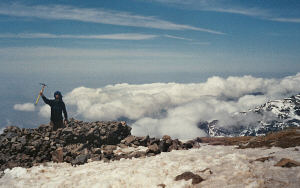

Just below the Jbel Toubkal summit, standing in a cairn fort
The ascent to the highest point on our trek at 3,200 meters was tough and Till was always ahead of me. Granted I had been sick and he was carrying a lighter pack, but I still think he would have been faster. We reached the pass and we could see both in front and behind us. Incredible views.
There was one lonely Berber hiding behind a rock. He was selling Coca-Cola for 20 Dirham at the pass. We felt sorry for him – a three-hour hike both ways to try and sell a coke to the few tourists that pass by. We bought two cokes and tried to leave. He stopped us, saying that he wanted the glass bottles back for the recycling refund.
He also wanted aspirin. I gave him one and he quickly put it in his pocket. I thought the guy had a headache so I asked him why he didn’t take it now. I offered some water, but he said, “No, later.” This happened several times. I am now convinced they have found some recreational use for them, like snorting them or downing a coke with an aspirin and running down the mountain really fast. There may be a legitimate use for them, but I stopped giving them out.
It was a little overcast and I decided to take a break next to a spring. I sat down and Till went ahead a bit. The sound of the water falling, beautiful views – I quickly passed out. Till thought I was following so he went even further. He waited 45 minutes and had to climb back up to get me. He was not pleased. The sun had come back out while I was sleeping and I was just lying there baking. I got up and tried to walk a bit and nearly collapsed. I had a bad case of heat exhaustion.
Till was out of water, I only had a little bit, we were exactly halfway on the trail, in the middle of nowhere, three hours to the next village. I was breathing heavily, hiding under a rock trying to get out of the sun and pouring spring water on my head. Till frantically tried to come up with a plan. Some included me leaving my pack and coming back the next day, setting camp or finding a donkey to ride down. None of these sounded feasible to me. After an hour of crouching under a boulder, my miraculous recovery powers kicked in. I popped up, threw my pack on, and said, “Let’s go. I’m fine.” Again, Till was amazed.
It took us ten hours instead of the recommended seven, but we made it to a picturesque gîte on a riverbed of aqua-green stones and plush terraces. We decided to try the couscous with vegetables, as they seemed less dangerous to my stomach. After waiting an hour, the owner brought a mound of food, enough for four or five people. We didn’t want to offend him, but my stomach had shrunk a bit and I was in no shape to eat so much. We did the best we could and slept inside this time – the reason being there were “before and after” pictures of a landslide that came through the village. I’m not sure being inside would have helped if it happened again.
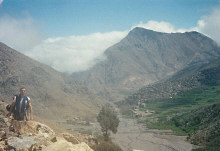

This is me getting lost on the wrong side of the valley. I had to backtrack onto the other side, crossing the washout.
![]()
![]()
The last day was twice as windy, but being in the valleys instead of on the ridges was a blessing. We were treated to incredible waterfalls all the way down the valley to Setti Fatma, where there were supposed to be even more. A little Berber kid elected to be our guide even as we tried to shoo him away. He didn’t like that so he led us down the wrong path. We lost an hour and had to backtrack.
Just outside the village, we were informed there were no more buses and maybe no more taxis. We walked quickly through the village to find plenty of cabs. The drivers were convinced that we were the last people around and that there would be no one to share with. This meant that they could charge 150 Dirham for each. We knew that we should only pay 20 Dirham at most, so we waited and tried to recruit people to go to Marrakech. We found two girls plus another couple. We had six but still the driver wanted tourist fare. He was beating a stick on the ground and looking really angry. We got in the cab, thinking it would be safer since he couldn’t get us with the stick. Relative safety!
We stopped every five minutes when the driver saw someone he knew. The girl next to me started massaging my hand and smiling at me. Not having enough French to know what she was saying, I smiled and nodded a lot. The passenger up front turned around and started spurting out numbers, prices I assume, at me. I got the picture, but just as it was about to get too awkward, something changed the mood.
Some kids were playing in the street with a ball. The driver liked to lay on the horn to let everyone know to get out of the way. This startled the children and they dropped the ball in the middle of the road. Well, the driver wanted some target practice and veered toward the ball. He nailed it. Poor kids, probably that ball was their only toy. They looked pitifully down at their flattened ball. Not wanting to anger the driver, we laughed along and prayed that we would get home quickly – seven passengers later, we did.
After days of not showering, I wanted a good soaking in a hammam, a bathhouse. I sweated, chugged a liter of orange juice and wandered back into the Djemaa el-Fna. Kohei still had no permit to play, Till’s girlfriend’s passport had expired so she couldn’t meet him in Casablanca, and I was told again that the Jbel Toubkal still had three meters of snow at the top.
